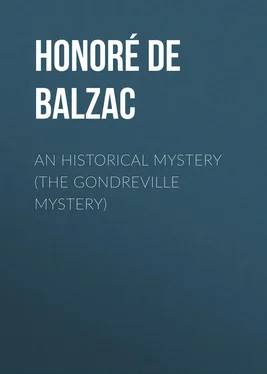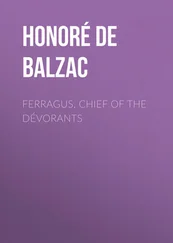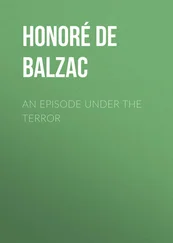Honoré Balzac - An Historical Mystery (The Gondreville Mystery)
Здесь есть возможность читать онлайн «Honoré Balzac - An Historical Mystery (The Gondreville Mystery)» — ознакомительный отрывок электронной книги совершенно бесплатно, а после прочтения отрывка купить полную версию. В некоторых случаях можно слушать аудио, скачать через торрент в формате fb2 и присутствует краткое содержание. Жанр: literature_19, foreign_antique, foreign_prose, на английском языке. Описание произведения, (предисловие) а так же отзывы посетителей доступны на портале библиотеки ЛибКат.
- Название:An Historical Mystery (The Gondreville Mystery)
- Автор:
- Жанр:
- Год:неизвестен
- ISBN:нет данных
- Рейтинг книги:3 / 5. Голосов: 1
-
Избранное:Добавить в избранное
- Отзывы:
-
Ваша оценка:
- 60
- 1
- 2
- 3
- 4
- 5
An Historical Mystery (The Gondreville Mystery): краткое содержание, описание и аннотация
Предлагаем к чтению аннотацию, описание, краткое содержание или предисловие (зависит от того, что написал сам автор книги «An Historical Mystery (The Gondreville Mystery)»). Если вы не нашли необходимую информацию о книге — напишите в комментариях, мы постараемся отыскать её.
An Historical Mystery (The Gondreville Mystery) — читать онлайн ознакомительный отрывок
Ниже представлен текст книги, разбитый по страницам. Система сохранения места последней прочитанной страницы, позволяет с удобством читать онлайн бесплатно книгу «An Historical Mystery (The Gondreville Mystery)», без необходимости каждый раз заново искать на чём Вы остановились. Поставьте закладку, и сможете в любой момент перейти на страницу, на которой закончили чтение.
Интервал:
Закладка:
“Who can it be that Michu is angry with?” said Marthe to her mother.
“Ever since he heard of Monsieur Malin’s arrival he has been gloomy,” replied the old woman. “But it is getting damp here, let us go in.”
After the two women had settled themselves in the chimney corner they heard Couraut’s bark.
“There’s my husband returning!” cried Marthe.
Michu passed up the stairs; his wife, uneasy, followed him to their bedroom.
“See if any one is about,” he said to her, in a voice of some emotion.
“No one,” she replied. “Marianne is in the field with the cow, and Gaucher – ”
“Where is Gaucher?” he asked.
“I don’t know.”
“I distrust that little scamp. Go up in the garret, look in the hay-loft, look everywhere for him.”
Marthe left the room to obey the order. When she returned she found Michu on his knees, praying.
“What is the matter?” she said, frightened.
The bailiff took his wife round the waist and drew her to him, saying in a voice of deep feeling: “If we never see each other again remember, my poor wife, that I loved you well. Follow minutely the instructions which you will find in a letter buried at the foot of the larch in that copse. It is enclosed in a tin tube. Do not touch it until after my death. And remember, Marthe, whatever happens to me, that in spite of man’s injustice, my arm has been the instrument of the justice of God.”
Marthe, who turned pale by degrees, became white as her own linen; she looked at her husband with fixed eyes widened by fear; she tried to speak, but her throat was dry. Michu disappeared like a shadow, having tied Couraut to the foot of his bed where the dog, after the manner of all dogs, howled in despair.
Michu’s anger against Monsieur Marion had serious grounds, but it was now concentrated on another man, far more criminal in his eyes, – on Malin, whose secrets were known to the bailiff, he being in a better position than others to understand the conduct of the State Councillor. Michu’s father-in-law had had, politically speaking, the confidence of the former representative to the Convention, through Grevin.
Perhaps it would be well here to relate the circumstances which brought the Simeuse and the Cinq-Cygne families into connection with Malin, – circumstances which weighed heavily on the fate of Mademoiselle de Cinq-Cygne’s twin cousins, but still more heavily on that of Marthe and Michu.
The Cinq-Cygne mansion at Troyes stands opposite to that of Simeuse. When the populace, incited by minds that were as shrewd as they were cautious, pillaged the hotel Simeuse, discovered the marquis and marchioness, who were accused of corresponding with the nation’s enemies, and delivered them to the national guards who took them to prison, the crowd shouted, “Now for the Cinq-Cygnes!” To their minds the Cinq-Cygnes were as guilty as other aristocrats. The brave and worthy Monsieur de Simeuse in the endeavor to save his two sons, then eighteen years of age, whose courage was likely to compromise them, had confided them, a few hours before the storm broke, to their aunt, the Comtesse de Cinq-Cygne. Two servants attached to the Simeuse family accompanied the young men to her house. The old marquis, who was anxious that his name should not die out, requested that what was happening might be concealed from his sons, even in the event of dire disaster. Laurence, the only daughter of the Comtesse de Cinq-Cygne, was then twelve years of age; her cousins both loved her and she loved them equally. Like other twins the Simeuse brothers were so alike that for a long while their mother dressed them in different colors to know them apart. The first comer, the eldest, was named Paul-Marie, the other Marie-Paul. Laurence de Cinq-Cygne, to whom their danger was revealed, played her woman’s part well though still a mere child. She coaxed and petted her cousins and kept them occupied until the very moment when the populace surrounded the Cinq-Cygne mansion. The two brothers then knew their danger for the first time, and looked at each other. Their resolution was instantly taken; they armed their own servants and those of the Comtesse de Cinq-Cygne, barricaded the doors, and stood guard at the windows, after closing the wooden blinds, with the five men-servants and the Abbe d’Hauteserre, a relative of the Cinq-Cygnes. These eight courageous champions poured a deadly fire into the crowd. Every shot killed or wounded an assailant. Laurence, instead of wringing her hands, loaded the guns with extraordinary coolness, and passed the balls and powder to those who needed them. The Comtesse de Cinq-Cygne was on her knees.
“What are you doing, mother?” said Laurence.
“I am praying,” she answered, “for them and for you.”
Sublime words, – said also by the mother of Godoy, prince of the Peace, in Spain, under similar circumstances.
In a moment eleven persons were killed and lying on the ground among a number of wounded. Such results either cool or excite a populace; either it grows savage at the work or discontinues it. On the present occasion those in advance recoiled; but the crowd behind them were there to kill and rob, and when they saw their own dead, they cried out: “Murder! Murder! Revenge!” The wiser heads went in search of the representative to the Convention, Malin. The twins, by this time aware of the disastrous events of the day, suspected Malin of desiring the ruin of their family, and of causing the arrest of their parents, and the suspicion soon became a certainty. They posted themselves beneath the porte-cochere, gun in hand, intending to kill Malin as soon as he made his appearance; but the countess lost her head; she imagined her house in ashes and her daughter assassinated, and she blamed the young men for their heroic defence and compelled them to desist. It was Laurence who opened the door slightly when Malin summoned the household to admit him. Seeing her, the representative relied upon the awe he expected to inspire in a mere child, and he entered the house. To his first words of inquiry as to why the family were making such a resistance, the girl replied: “If you really desire to give liberty to France how is it that you do not protect us in our homes? They are trying to tear down this house, monsieur, to murder us, and you say we have no right to oppose force to force!”
Malin stood rooted to the ground.
“You, the son of a mason employed by the Grand Marquis to build his castle!” exclaimed Marie-Paul, “you have let them drag our father to prison – you have believed calumnies!”
“He shall be released at once,” said Malin, who thought himself lost when he saw each youth clutch his weapon convulsively.
“You owe your life to that promise,” said Marie-Paul, solemnly. “If it is not fulfilled to-night we shall find you again.”
“As to that howling populace,” said Laurence, “If you do not send them away, the next blood will be yours. Now, Monsieur Malin, leave this house!”
The Conventionalist did leave it, and he harangued the crowd, dwelling on the sacred rights of the domestic hearth, the habeas corpus and the English “home.” He told them that the law and the people were sovereigns, that the law was the people, and that the people could only act through the law, and that power was vested in the law. The particular law of personal necessity made him eloquent, and he managed to disperse the crowd. But he never forgot the contemptuous expression of the two brothers, nor the “Leave this house!” of Mademoiselle de Cinq-Cygne. Therefore, when it was a question of selling the estates of the Comte de Cinq-Cygne, Laurence’s brother, as national property, the sale was rigorously made. The agents left nothing for Laurence but the chateau, the park and gardens, and one farm called that of Cinq-Cygne. Malin instructed the appraisers that Laurence had no rights beyond her legal share, – the nation taking possession of all that belonged to her brother, who had emigrated and, above all, had borne arms against the Republic.
Читать дальшеИнтервал:
Закладка:
Похожие книги на «An Historical Mystery (The Gondreville Mystery)»
Представляем Вашему вниманию похожие книги на «An Historical Mystery (The Gondreville Mystery)» списком для выбора. Мы отобрали схожую по названию и смыслу литературу в надежде предоставить читателям больше вариантов отыскать новые, интересные, ещё непрочитанные произведения.
Обсуждение, отзывы о книге «An Historical Mystery (The Gondreville Mystery)» и просто собственные мнения читателей. Оставьте ваши комментарии, напишите, что Вы думаете о произведении, его смысле или главных героях. Укажите что конкретно понравилось, а что нет, и почему Вы так считаете.












